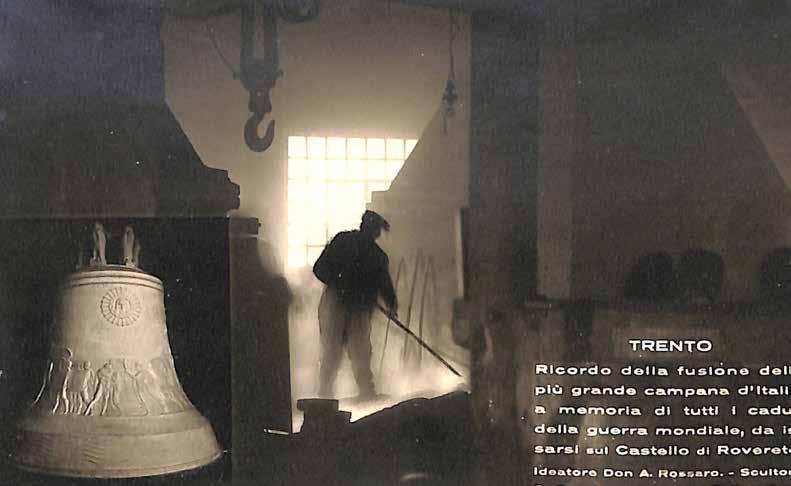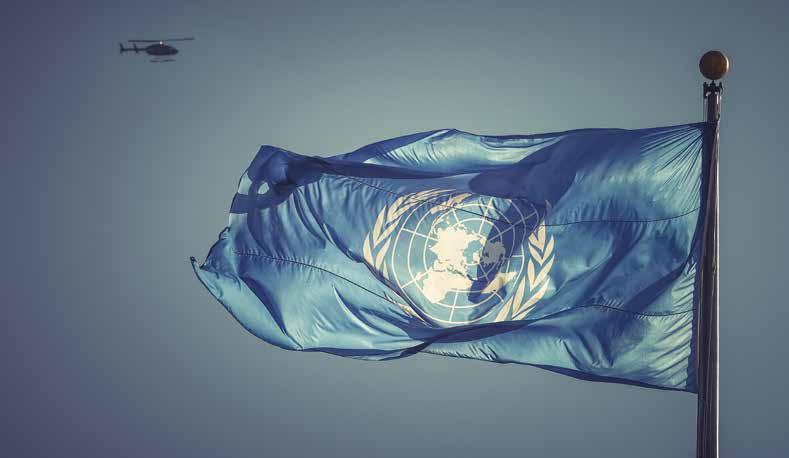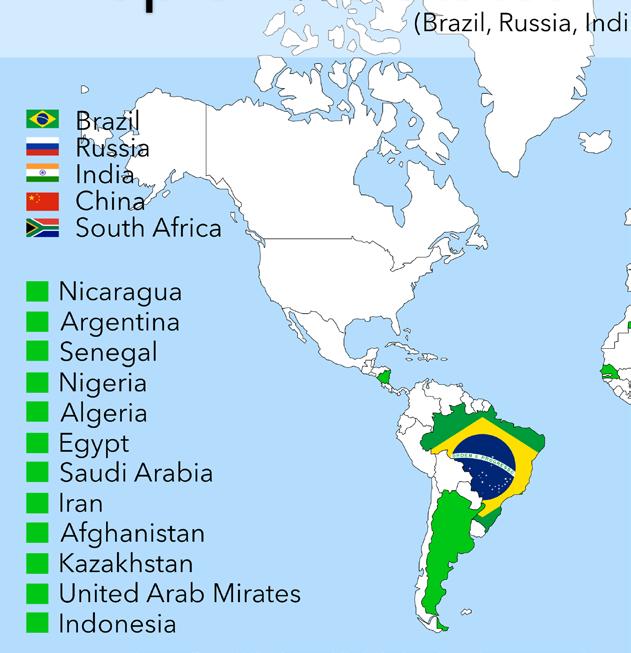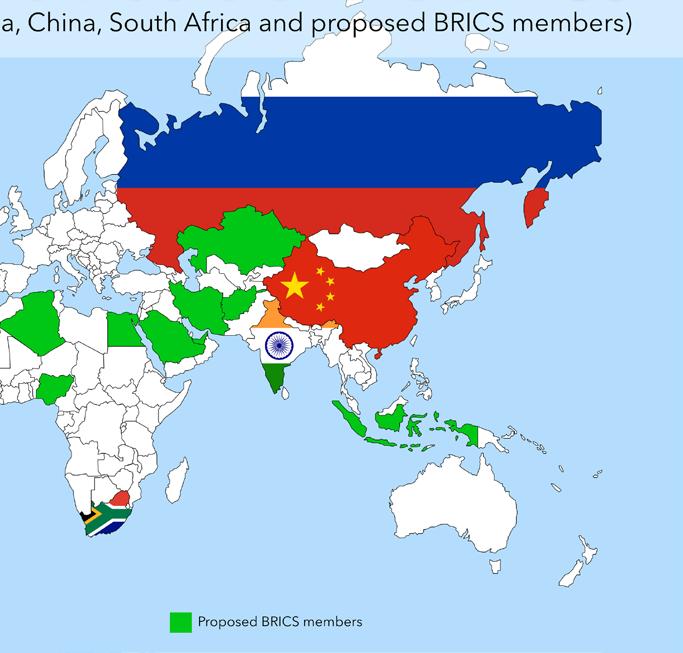The future of BRICS
In the dictionary an acronym is defined as «a noun formed by joining the initial letters or syllables of several words.» In modern language the use of such formulas (often for reasons of speed, but oftentimes - one almost gets the impression - to impress the interlocutor) is becoming more and more frequent and the sector of international relations is certainly no exception to this observation.
The UN, NATO, OECD and OSCE represent, just to name a few, the acronyms of important multilateral organizations, of which - in all honesty - it might sometimes be difficult to reconstruct the name in full.
In recent times, one of the most cited acronyms in this field is BRICS, unlike others easy to interpret as it is made up of the initials of five (large) countries, namely Brazil, Russia, India, China and South Africa. It is an informal forum (i.e., not based on specific agreements) of States, where Presidents and Heads of Government have met annually since 2010 for a joint analysis of the main political, economic and social issues of current affairs.

An aggregation of significant importance, if we consider the fact that today it represents 41 percent of the earth’s population and 26 percent of the global Gross Domestic Product (GDP).
To be continued on page 6...
For whom the Bell tolls Ideas come at dusk
04
Zelensky and Lavrov speak to the Security Council
08
Happening at the UN World Food Day
Ideas come at dusk
Once something has been done everything seems natural, almost obvious. But before, quite simply, no one had thought of it. This section aims to relate how ideas become reality. The creativity it takes, the commitment you must put in, the effort to convince everyone, the difficulties you encounter, the mistakes you make and the satisfaction of hearing the Bell of the Fallen ring for the first time. But it doesn’t end there, because from that moment begins the story that leads to us, to the Maria Dolens that we know, to the relationships with the United Nations and the Council of Europe, to the Foundation Presidents who have presided, to the passion of those who work every day, to the amazement of visitors when they hear the emotional power of the first toll,
and to the Foundation’s Avenue of Flags which is continually enriched by another country that believes in it, that adheres to the Peace Protocol because there is no alternative to dialogue.
The first toll of Maria Dolens (the largest swinging bell in the world that rings in full peal) was heard on October 4, 1925. It could all stop there, on that day and it would already be a good story, but we need to understand what that event meant for the decades that followed, whether the seeds sown bore good fruit. Above all however, we must understand whether the idea of a provincial priest who decided to create a symbol of world peace immediately after the Great War by fusing together cannons used by armies that fought against each other is still relevant. Does it help us today? Is it still useful for understanding the world around us? Until its centenary, which will be celebrated in 2025, we will try to answer these questions, we will retrace the path of an ideal sustained by people who are often very determined, sometimes stubborn, never willing to compromise on the founding values of peace. We will do so thanks to the writings of historians and intellectuals who have explored the topic in depth, and we will start from the beginning, from the sunset of 5 May 1921, when Father Don Antonio Rossaro had the idea that led him a few years later to witness the first chime by Maria Dolens. He himself tells how it happened, under the pseudonym of Timo del Leno, a fictional character who was under the Arco della Pace in Milan that day. The tone is emphatic, fairytale-like, perhaps a little naive. But we must at least grant this to a visionary.
«It was sunset on May 5, 1921, and he [Timo del Leno] had lingered to read in a newspaper, how at that time, throughout France, thousands of cannons would celebrate the centenary of Napoleon’s death. Under the vault of the historic Arch, he was absorbed in thought in the splendour of that epic, when suddenly, looking up at a burning sunset, so beautiful towards the Resegone, he was surprised by the sound of the Ave Maria of a nearby Convent. His heart was torn in a tumult of weapons and claustral singing, between two worlds clashing with each other, that of war and that of peace. In the distance, the roars of the cannon disappeared into the immensity of the horizon; nearby, the ringing of the bell was lost in the mysterious regions of his heart. And the idea of peace triumphed and exulted in a festive chirping of swallows, singing under a gentle bloom of stars.»

Beyond the imaginative style, wrote the historian Armando Vadagnini commenting on the reconstruction, «one can grasp in the author the intuition of what was the spirit of the era following the end of the conflict: on the one hand the memory of those who had remained, still not appeased after such a ferocious war; on the other, the profound desire to find the pacification of hearts before a diplomatic conciliation through treaties and political compromises. Hence the dream that the priest from Rovereto cherished for days and days: to create a “monument that was not the usual cold allegory translated into bronze or marble, but which, loudly, resonated and shook hearts in the vindication of so many missing heroes, of many victims without the comfort of tears and flowers”.
This was the premise that led Father Rossaro to create the Bell of the Fallen of Rovereto, for which he

had already chosen Queen Mother Margherita of Savoy as godmother.»
The Campana, therefore, was born on solid territorial foundations, it creatively interpreted Trentino’s long history and it found lifeblood in the atmosphere comprised of strong gestures of solidarity of which Rovereto was and is at the heart. «But his project - continues Vadagnini - was also part of a much broader vision that embraced all of humanity, in the contrast between war and peace by which every historical era is marked. The moral premise on which that project was based was first and foremost that of remembering the victims of the war and those who were killed for noble ideals, and secondly that of inducing humanity to seek the ways of peace as a basis for a recovery of civil life and human progress. The memory of the past should not be erased, but neither can it serve to
rekindle enmities that have been handed down through history. The Bell was inspired by the Franciscan spirit, which did not mean a generic irenicism, but a clear vision of Man plagued by the suffering of war, which called for the pacification of hearts and a return to collaboration to make more human “the flowerbed that makes us so ferocious.”
Unfortunately, a few decades later the world repeated the same mistake again. World War II brought everything back in time. The tragedy reoccurred and anyone who spoke of peace simply seemed naive. But ideas, when they are strong, advance underground like karst rivers. And that of Father Rossaro continued to channel into people’s souls, to force its way through the misgivings. It was only a matter of time before it resurfaced.
(to be continued)
Casting of the first Bell on 30 October 1924 at the ‘Luigi Colbacchini e Figli’ foundry in Trento (Archive of the Rovereto Peace Bell Foundation)A historic day (maybe)
ZELENSKY AND LAVROV SPEAK TO THE SECURITY COUNCIL
The term “historical” is often used inappropriately. It is therefore better to stay away from this definition. Sometimes, however, the temptation is strong, as when representatives of two countries at war with each other sit in the same room. It happened on September 20 at the United Nations, even though Ukrainian President Volodymyr Zelensky had already left when Russian Foreign Minister Sergei Lavrov arrived. However, not too far from the Kiev head of state sat Moscow’s ambassador to the UN Vasilij Nebenzja, who was careful to point out that his head of diplomacy was very busy and could not arrive earlier.
Zelensky came down hard when opening the session of the Security Council, held on the sidelines of the General Assembly. The view is very direct and clear. «It is impossible to stop the war because all attempts are vetoed by the aggressor.» «Most of the world,» he said, recognizes that Russia’s actions in Ukraine are «criminal and unprovoked and aimed at seizing Ukrainian territory and resources.» The Security Council, he added, raising some criticism towards the United Nations, «remains stuck in a stalemate due to opposition from Moscow.» As a direct consequence, Zelensky asked, as he had already done in the past, that the Kremlin be deprived of the right of veto. The president also justified the request: the right of veto belonged to the USSR and not to Vladimir Putin’s Russia, which uses it in an «illegal» way to «disguise aggression and genocide.»
The request appears extremely difficult to implement, also because Russia itself could stop its course. However, there is a precedent dating back to 1971, when the United Nations General Assembly stripped Taiwan of the veto power it held as a representative of China, handing it instead to the communist government in Beijing. In second place, the Ukrainian leader called for an expansion of the Security Council with permanent seats to be assigned to Africa, Asia and Germany. But here too one might wonder whether such an extensive organism would be more efficient or would it be unmanageable.
The issue to be resolved now, however, remains the conflict and on this the Ukrainian president has his own ideas which, obviously, are not even officially taken into consideration by the other party. Kiev’s plan is made up of 10 points and places the restoration of the borders prior to the invasion of Crimea in 2014 as an indispensable condition. Currently the issue does not appear to be under discussion.
Instead, the discussion was on a question of form, which obviously, in multilateral meetings becomes substance. The fact that Zelensky spoke first provoked protests from the representative of Moscow, according to whom this procedure would «undermine the authority of the Security Council», transforming it into a «one-man show».

The Albanian Prime Minister Edi Rama, the current president, took it upon himself to re-establish the priorities: «There is a solution, stop the war and President Zelensky will not speak.»
After the Ukrainian leader left the room, the challenge was resumed between the US Secretary of State, Antony Blinken, supported by all his Western colleagues, and Lavrov. The head of US diplomacy accused Russia of having «torn the UN Charter» and of committing «crimes against humanity» every day in Ukraine. The Secretary of State also tried to reassure the Global South by emphasizing the fact that it is a «false choice» between remaining alongside Ukraine and addressing other crises, such as climate change, arguing that «we can and must do both». Lavrov, for his part, accused the US and its allies of having interfered in Ukrainian affairs since the fall of the USSR to impose pro-Western policies on Kiev and placed the blame for the increased risk of a «global conflict» on the West». In particular, he lashed out at NATO, guilty of refusing to engage in dialogue that could have prevented tensions in Europe. Then came the moment of the most predictable rhetoric, with the statement, now a recurring theme at the Kremlin, that any anti-Russian government in Kiev is nothing more than a «puppet» of the US, suggesting that Washington could at any time «order» Zelensky to negotiate with Russia.
«Moscow does not reject negotiations, it is Zelensky who signed a decree to prohibit dialogue with President Putin,» Lavrov recalled, ending by defending the legitimacy of the Russian veto power. In short, the doors seem closed to dialogue, even if China has tried to take credit for its role as mediator, claiming to have been constructive «in its own way» in the attempt to create a way out of the war in Ukraine and urging other countries to avoid «pouring fuel on the fire».
Who knows if it was a historic day. Who knows if they will make a film about these events, such as that which recalls the phrase uttered by the US ambassador to the UN on 25 October 1962, amid the Cuban Missile Crisis. During an emergency session of the Security Council the American diplomat pressed the Soviet representative, Valerian Zorin, asking him if his country was installing missiles in Cuba and demanding an immediate response: «Don’t wait for the translation!» When Zorin refused to answer, Stevenson compounded the matter by assuring that he could wait: «Until hell freezes over.» In that case it ended well, the third world war was averted. But evidently history and the films that portray it teach little if sixty-one years later we find ourselves, more or less, in the same situation.

Map of BRICS member states (Brazil, Russia, India, China, South Africa and other BRICS candidates)

To be continued from page 1...
The BRICS group, defined by Brazilian President Lula as «the club of a possible new world», recently held the 15th Summit in its history in Johannesburg, with the notable absence of Russian President Putin, held back at home by judicial concerns (As is known, the International Criminal Court in The Hague has issued a warrant for his arrest). The meeting confirmed the clear leadership exercised by China (to give an idea of its superiority, it is enough to know that Beijing holds 69 percent of the overall trade between the 5 members) and its firm intention to characterize the group more and more as anti-American and anti-Western. Since the beginning of 2022, the Russian-Ukrainian conflict has contributed to providing further acceleration to this goal, if we reflect on the fact that of the
other four member countries none intended to comply with the economic-financial (not to mention military) sanctions ordered by Washington and Brussels towards Moscow.
Beyond the recurring statements in the BRICS context, which not by chance also re-emerged in Johannesburg, of wanting to promote a profound transformation of the international financial institutions (World Bank and Monetary Fund) with the “displacement” of the dollar from the role of primary reference currency, the data with the greatest political weight that emerged in South Africa was the news of the imminent opening of the “bloc” to new members. Here also, Xi Jinping’s plan to use the legitimate interest of the so-called Global South for his own purposes in benefiting from multipolarity, considered by emerging nations to be the system of
international relations most suited to their interests and aspirations, is easily recognisable.
Within a broader list (there would in fact be 18 potential member states), Saudi Arabia, the United Arab Emirates, Argentina, Ethiopia, Iran and Egypt have been designated as candidates for the first round of expansion, to be completed by 2024. As a result of this evolution, the size of the group seems destined to increase and, in the future, to engage critically with the main “Western” reference entity, the G7. The latter would continue, at least in the short term, to remain superior in terms of wealth produced, but would be inferior in terms of the percentage of population represented.
Given this data, it seems correct to highlight how the aforementioned grand project faces considerable opposi-
tion even within BRICS itself. Countries such as Brazil and South Africa, currently exclusive exponents of the demands of entire continents, would certainly not look favourably upon the entry, also for reasons of prestige, “into the family” of fearsome regional competitors such as, respectively, Argentina and Egypt. Furthermore, an opening to new members after insufficient deliberation would further dilute a level of homogeneity which already within the current “5” format cannot be considered satisfactory.
If China and Russia can in fact be classified as autocracies hostile to the United States and Europe, Brazil, India and South Africa (rightly) boast of rather advanced internal democratic systems, as well as relations of normal collaboration with the West. In the economic sphere, the contradictory situation is exacerbated by the fact
that the GDP per capita of an Indian citizen represents only a fifth of that of an inhabitant of China and Russia, even though the growth rate recorded by the New Delhi economy is decidedly higher compared to that of all other members.
Based on these considerations, the forecast of the experts goes in the direction of considering the process of expansion of BRICS probable, but not so promptly and with less inclusive methods as those hypothesized by Beijing. The question linked to the future function of the G20 also contributes to this prudential evaluation, the forum in which both the richest industrialized nations and the main emerging realities coexist, albeit not without difficulties. In the very recent G20 Summit in New Delhi, deserted by both Putin (due to the already mentioned judicial issues) and Xi Jinping (due to a childish “double

resentment” towards Modi and Biden), the limits of the group were undeniably revealed, primarily regarding the evaluation of the Russian-Ukrainian conflict. At the same time, it is legitimate to doubt whether its possible substitution with a “BRICS Plus” of increased numerical consistency, integrated by member countries without aligned positions or a common agenda, will translate into an effective enrichment and recognized consolidation of today’s multilateral system.
And, returning to the initial point, with what acronym could today’s BRICS be renamed in the event of a doubling and, potentially, a tripling of its members? A linguistic challenge that reveals the impossible and which, alone, may lead us to reflect on whether the plan is appropriate.
Reggente Marco Marsilli, Foundation PresidentIt’s not enough to save shower water
When we talk about nutrition, we think it’s about eating whereas the issue mainly concerns water. There seems to be a lot of it, everywhere. Seas and oceans cover over 70 percent of the Earth’s surface. The fact is that only 2.5 percent of the water at our disposal is soft, that is, drinkable and suitable for use in agriculture and various industrial activities. And this is the reason why this liquid, in addition to being a large part of the material of which our organism is made, is the driving force of the economy and nature as well as the basic element of the food pyramid. To reflect on this theme, the United Nations established World Food Day, on 16 October of each year. The moment is useful to delve deeper into various issues that are much more complex than they appear, originating from one fact: agriculture is responsible for 72 percent of freshwater consumption.
The alarm comes from the United Nations Food and Agriculture Organization (FAO), which highlights how rapid demographic growth, urbanisation, economic development and climate change are increasingly putting a strain on our planet’s water resources.

So, it’s fine to take a slightly shorter shower and turn off the tap while brushing your teeth, but it’s not enough to help the 2.4 billion people who live in countries subject
to water stress. Many of them are small farmers already struggling to meet their daily needs, in particular indigenous populations, migrants and refugees. Within these categories, the most disadvantaged are women. Obviously, competition for access to this fundamental resource is becoming increasingly fierce, with the consequence that water itself is steadily becoming the cause of armed conflicts. Once again, rights, hunger, environment, war, economy and technology prove to be closely linked.
Just to give a few examples, according to FAO data, around 600 million people depend, at least in part, on aquatic food systems and are exposed to the effects of pollution, ecosystem degradation, unsustainable practices and climate change.
It is therefore necessary to produce more food and other agricultural raw materials with less water. This is a technological problem. At the same time, aquatic food systems must be safeguarded and for this we need environmental experts. Furthermore, we must ensure that the benefits are distributed equitably, leaving no one behind. This is the task of economics. Finally, politics is called upon to define strategies that exploit scientific data, innovation and intersectoral coordination in order to plan and manage water resources better.
In short, we continue to save water in our homes, but let us not delude ourselves that it is enough. There is much more to be done at a scientific and political level to avoid climate disasters and wars. Time is short, but it hasn’t run out yet.
